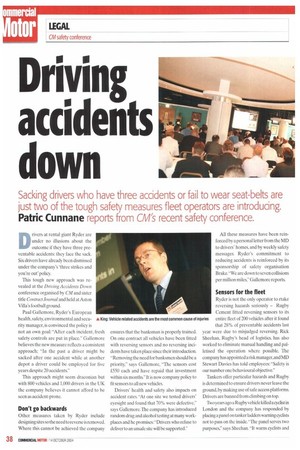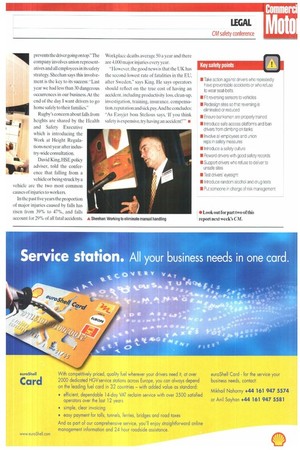Driving accidents down
Page 40

Page 41

If you've noticed an error in this article please click here to report it so we can fix it.
Sacking drivers who have three accidents or fail to wear seat-belts are just two of the tough safety measures fleet operators are introducing.
Patric Cunnane reports from CM'S recent safety conference.
Drivers at rental giant Ryder are under no illusions about the outcome if they have three preventable accidents: they face the sack. Six drivers have already been dismissed under the company's 'three strikes and you're out' policy.
This tough new approach was revealed at the Driving Accidents Down conference organised by CM and sister title Contract Journal and held at Aston Villa's football ground.
Paul Gallemore, Ryder's European health, safety, environmental and security manager, is convinced the policy is not an own goal: "After each incident, fresh safety controls are put in place." Gallemore believes the new measure reflects a consistent approach: -In the past a driver might be sacked after one accident while at another depot a driver could be employed for five years despite 20 accidents."
This approach might seem draconian but with 800 vehicles and 1,000 drivers in the UK the company believes it cannot afford to be seen as accident-prone.
Don't go backwards
Other measures taken by Ryder include designing sites so the need to reverse is removed. Where this cannot be achieved the company ensures that the banksman is properly trained. On one contract all vehicles have been fitted with reversing sensors and no reversing incidents have taken place since their introduction. "Removing the need for banksmen should be a priority," says Gallemore, "The sensors cost £550 each and have repaid that investment within six months." It is now company policy to fit sensors to all new vehicles.
Drivers' health and safety also impacts on accident rates. "At one site we tested drivers' eyesight and found that 70% were defective," says Gallemore. The company has introduced random drug and alcohol testing at many workplaces and he promises: "Drivers who refuse to deliver to an unsafe site will be supported. All these measures have been reinforced by a personal letter from the MD to drivers' homes, and by weekly safety messages. Ryder's commitment to reducing accidents is reinforced by its sponsorship of safety organisation Brake. "We are down to seven collisions per million miles," Gallemore reports.
Sensors for the fleet
Ryder is not the only operator to rtake reversing hazards seriously — Rugby Cement fitted reversing sensors to its entire fleet of 200 vehicles after it found that 28% of preventable accidents last year were due to misjudged reversing. Rick Sheehan, Rugby's bead of logistics, has also worked to eliminate manual handling and palletised the operation where possible. The company has appointed a risk manager, and MD Stewart Davies has told employees: "Safety is our number one behavioural objective."
Tankers offer particular hazards and Rugby is determined to ensure drivers never leave the ground, by making use of safe access platforms. Drivers are banned from climbing on top.
Two years ago a Rugby vehicle killed a cyclist in London and the company has responded by placing a panel on tanker ladders warning cyclists not to pass on the inside. "The panel serves two purposes," says Sheehan. "It warns cyclists and prevents the driver going on top." The company involves union representatives and all employees in its safety strategy. Sheehan says this involvement is the key to its success: "Last year we had less than 30 dangerous occurrences in our business, At the end of the day I want drivers to go home safely to their families."
Rugby's concern about falls from heights are shared by the Health and Safety Executive which is introducing the Work at Height Regulations next year after industry-wide consultation.
David King, HSE policy adviser, told the conference that falling from a vehicle or being struck by a vehicle are the two most common causes of injuries to workers.
In the past five years the proportion of major injuries caused by falls has risen from 39% to 47%, and falls account for 29% of all fatal accidents. Workplace deaths average 50 a year and there are 4.000 major injuries every year.
"However, the good news is that the UK has the second-lowest rate of fatalities in the EU, after Sweden," says King. He says operators should reflect on the true cost of having an accident, including productivity loss, clean-up, investigation, training, insurance. compensation, reputation and sick pay. And he concludes: "As Easyjet boss Stelious says, 'If you think safety is expensive. try having an accident!" in


































































































































































































